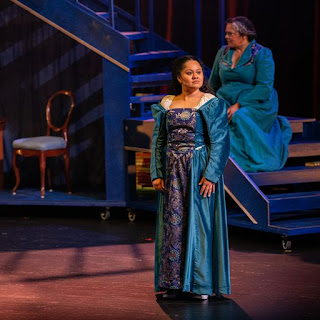Emilia by Morgan Lloyd Malcolm.
Directed by Petra Kalive. Assistant director Darylin Ramondo. Movement director. Xanthe Beesley. Set designer Emily Collett. Costume designer Zoe Rouse. Lighting designer Katie Sfetkidis. Lighting Associate Harriet Hogan. Co sound designers and composers Sharyn Brand and Emah Fox.Movement associate Jennifer Ma. Hair and makeup Shula Kate.
Cast EMILIA 1 Manali Datar EMILIA 2 Cessalee Stovall EMILIA 3 Lisa Maza WILLIAM SHAKESPEARE / MAN 2 Heidi Arena LADY MARGARET CLIFFORD / MIDWIFE / MAN 1 Emma J Hawkins LORD ALPHONSO LANIER / LORD COLLINS / EMILIA (OTHELLO) AND OTHERS Catherine Glavicic MARGARET JOHNSON / MARY SIDNEY / HESTER Carita Farrer JUDITH / PRIEST / LORD HENRY CAREY Genevieve Picot LADY CORDELIA / LADY ANNE AND OTHERS Jing-Xuan Chan SUSAN BERTIE THE COUNTESS OF KENT / MARY BOB Amanda LaBonté LADY KATHERINE / DESDEMONA (OTHELLO) Sonya Suares LORD THOMAS HOWARD / DAVE / FLORA Sophie Lampel EVE / LADY HELENA Sarah Fitzgerald STANDBY / COVERS Nazaree Dickerson Kuda Mapeza Izabella Yen
Essential Theatre is a female led and values driven company headed by Amanda Labonte and Sophie Lampel. The Playhouse. Canberra Theatre Centre. December 2-3 2022
Reviewed by Peter Wilkins
After four hundred years the identity of William Shakespeare’s Dark Lady of the Sonnets remains a mystery, shrouded in conjecture. Sonnet 127, the first of the sonnets dedicated to the mysterious woman describes a lady with black eyes and black wiry hair. Was she of Mediterranean descent or perhaps of African heritage? In 1611 Emilia Bassano published her volume of poems, Salve Deus Rex Judaeorum, a collection praising notable women including the late Queen Elizabeth 1st. Sonnet 127 was written in around 1609. It is therefore very probable that Shakespeare knew Emilia Bassano. In fact playwright Morgon Lloyd Malcolm makes it clear in her colourful, vital and lively account of Emilia Bassano’s life that not only did Emilia Lanier (nee Bassano) know the famous dramatist, but that she could have been his mistress and the mother of his illegitimate child.
 |
| Manali Datar as Emilia 1 |
In Emilia, produced by Essential Theatre, a female and non binary cast
play multiple roles and leave an audience in no doubt that Emilia Bassano does
indeed lay the main claim to the mysterious title of Dark Lady of the Sonnets.
To stride the span of Bassano’s life and dramatic experiences, three actors
play the role of Emilia at different times
in her 56 years. Manali Datar gives
an enchanting performance as Emilia 1, separated from her mother, deprived of a
father and eventually becoming the mistress of Lord Howard ( the Lord Chamberlain,
the wife of the foppish Alphonso Lanier and the mistress of William Shakespeare and
possibly the mother of his illegitimate child who died soon after birth.
Cessalee Stavall plays the older and more mature Emilia. It is suitably sombre
performance and Stavall lends the character an emotional pain as Bassano
struggles to survive and only survives after a near drowning – or was it an
attempt to take her own life. Accomplished and commanding Meriam/Yindinji/Dutch
performer Lisa Maza, last seen in Canberra in Belco Arts’ production of Dylan
van den Berg’s Ngadjung, assumes the role of the oldest Emilia and
narrator of Emilia’s tale.
 |
| Lisa Maza as Emilia 3 |
Director Kalive notes that the ensemble have been inspired by Australian vaudeville tradition to infuse this seventeenth century story with humour, satire, song and dance that captures a lively and entrtaining quality to a show of eccentric charcaters, absurd situations and moments of pathos and high drama. To fully appreciate the real force of this production one needs to understand the impact of Emilia 2’s delivery of Emilia’s speech to Desdemona in Othello or references to The Taming of the Shrew. Injustice and cruel subjugation of the female sex reaches a crescendo of furious indignation in Emilia 3 ‘s screaming call to the audience to “burn the f…ing house down” It is an exhortation that diminishes the power of the drama to bear the standard of outrage and rebellion. Malcolm’s play serves the purpose well. It is entertaining, funny, satirical and ironic and a fine cast embrace the characters with relish and irreverent glee. Sophie Lampel’s Lord Thomas Howard, Heidi Arena’s William Shakespeare, Catherine Glavick’s Lord Alphonso Lanier are all played with joyfully ridiculing gusto .
 |
| Cessalee Stovall as Emilia 2 |
